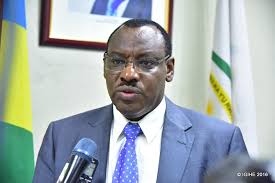Rwanda projecting 6.2pc growth in 2017
 KIGALI, MAY 05 – Rwanda expects economic growth to rebound to 6.2 percent in 2017 after performing at 5.9 percent in 2016 on the back of increased economic activity as the global economy begins to recover from the commodity crash of 2015.
KIGALI, MAY 05 – Rwanda expects economic growth to rebound to 6.2 percent in 2017 after performing at 5.9 percent in 2016 on the back of increased economic activity as the global economy begins to recover from the commodity crash of 2015.
The budget deficit is also expected to narrow 1 percent in fiscal 2017/18 on a larger budget of $2.5 billion, $170.5 million up on the preceding year while inflation will edge up to 7percent owing to a lower than expected harvest and rising global fuel and food prices.
Finance Minister Claver Gatete also expects FDI to track a positive curve, rising to from $258.9m last fiscal year to $307.2m in 2017 and $404.4 million in 2018 before peaking at $439m in 2019.
In the budget framework paper presented to the lower chamber of the Rwandan parliament, Gatete said borrowing from the domestic market would remain near flat with expenditure financed through higher domestic revenues and concessional borrowing. Government from the domestic market will stay flat to give room for more lending to the private sector.
Domestic collections are projected at $1.7 billion as a result recruitment of more VAT eligible taxpayers and further sealing of loopholes.
The central banker will drawdown $109.5 million USD of national reserves, reducing gross official reserves from $1001.5 million at end 2016 to $989.2 million at end 2017. This however will not dilute import cover which will stay 4 months owing to a muted appetite for imports.
National carrier Rwandair whose imports of a pair of Airbus A330 aircraft last year tilted the balance, has paused further aircraft acquisitions.
“In line with these policies, the overall fiscal deficit including grants will be maintained at 3½ to 4 percent of GDP during the 2017/18-2019/20 period, from 4.7 percent currently projected for 2016/17, and an average of 4½ percent during the four fiscal years before,” says Gatete.
He adds that Rwanda is working towards meeting EAC monetary policy convergence criteria that member states to hold the fiscal deficit at 3 percent of GDP starting 2022.
Recurrent expenditure will consume $1.35 billion while development expenditure has been allocated $937 million.

 African Heads of state head to South Korea next week for Summit talks
African Heads of state head to South Korea next week for Summit talks
 Trading leads as main source of income for Ugandans
Trading leads as main source of income for Ugandans
 New leadership for bankers’ umbrella as total assets top $12 billion
New leadership for bankers’ umbrella as total assets top $12 billion
 Brussels Airlines to announce Nairobi service
Brussels Airlines to announce Nairobi service
 SITA promises enhanced travel experience after Materna acquisition
SITA promises enhanced travel experience after Materna acquisition
 Saudia’s 105 aircraft order stretches A320neo lead over rival Max
Saudia’s 105 aircraft order stretches A320neo lead over rival Max
